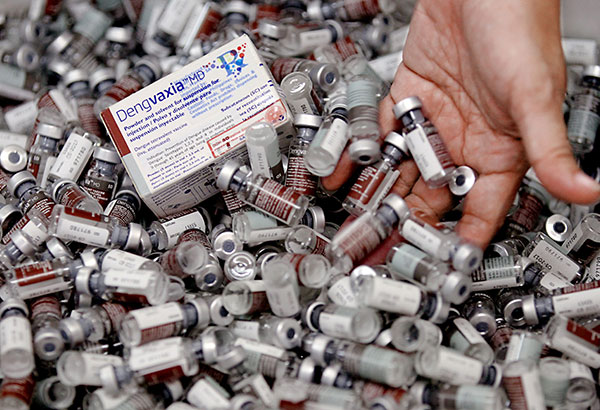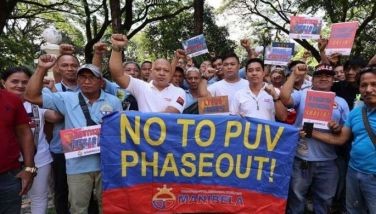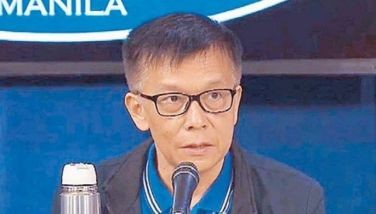WHO denies endorsing Dengvaxia to DOH

Photo shows empty vials of the dengue vaccine Dengvaxia at the Manila Central Vaccine storage room in Sta. Cruz, Manila yesterday. Krizjohn Rosales
MANILA, Philippines — The World Health Organization (WHO) office for Western Pacific Region on Tuesday night denied the claims of the Department of Health (DOH) that the latter was guided by the WHO’s recommendation when it included Dengvaxia in its dengue vaccination program.
In a statement, the WHO said the program was already underway when their position paper on dengue vaccine was published in July 2016, based on recommendations of the Strategic Group of Experts (SAGE) on Immunization which met and published preliminary advice in mid-April 2016.
The WHO noted that the position paper also “did not include a recommendation to countries to introduce the dengue vaccine into their national immunization programs.”
“Rather, the WHO outlined a series of considerations national governments should take into account in deciding whether to introduce the vaccine, based on a review of available data at the time, along with possible risks,” the agency added.
SAGE had recommended that the use of vaccine should only be considered in areas where a high proportion – preferably at least 70 percent – of the community had already been exposed to the virus, that the vaccine should only be provided to people nine years old and above and that people being vaccinated should receive three doses.
“The WHO acknowledged in mid-April 2016 that these conditions appeared to be met in the three regions of the Philippines in which the dengue vaccination effort was already ongoing at that time, noting that the decision to roll out the vaccine had been taken by the DOH before WHO’s advice became available,” the agency said.
The STAR tried but failed to reach the DOH for comment.
The program was launched on April 4, 2016 by then health secretary Janet Garin in Metro Manila, Region 3 and Region 4A where dengue is endemic.
Prior to this, however, the Philippines took part in the three phases of the clinical trial of vaccine manufacturer Sanofi Pasteur, which started in 2011 and involved some 3,500 children in San Pablo City, Laguna and in Cebu City.
The WHO maintained that it is now looking forward to the advice of SAGE which is set to meet next week to review the new evidence that the vaccine could lead to more severe forms of dengue if given to those who have not had dengue in the past.
“As always, we stand ready to work with the DOH to provide information to affected families and to support the DOH’s deliberations on the future of the dengue vaccination program,” the agency said.
WHO has advised “anyone (vaccinated or not) with signs of dengue disease – high fever, severe headache, pain behind the eyes, muscle and joint pains, nausea, vomiting, swollen glands and/or rash – to seek medical care.”
French advised against Dengvaxia
Meanwhile, a public body close to France’s health ministry last year advised against the use of the Dengvaxia dengue vaccine in the country’s overseas territories currently at the center of a health scare, regulatory documents have shown.
Concerns surrounding the vaccine, sold by French drugmaker Sanofi, have prompted the Philippines to halt its sale and suspend a government program to immunize hundreds of thousands of children.
The WHO said on Tuesday it supported the Philippines’ decision until more information was available.
It said its SAGE on Immunization would meet to review evidence next week.
The WHO, which issued a report identifying the vaccine’s safety risks in mid-2016, recommended it only be used in people who had prior dengue infection.
Documents issued in 2016 by the Haut Conseil de la Sante Publique, a public body close to the French health ministry, showed France’s overseas territories were also warned of risks linked to the vaccine.
The health body advised in June 2016 the vaccine not be used in territories such as the Caribbean islands of La Martinique and Guadalupe and French Guiana on the grounds that its effectiveness was not demonstrated with people who had not previously been exposed to the virus.
In October 2016, it also warned of safety risks.
Dengue is a mosquito-borne tropical disease that kills about 20,000 people a year and infects hundreds of millions more.
Brazil, which shares a border with French Guiana, said on Monday it had suggested restrictions on the use of Dengvaxia but had not suspended access to the vaccine.
Dengvaxia has been approved in 19 countries and used in 11. It is currently under review by European health regulators.
- Latest
- Trending






























